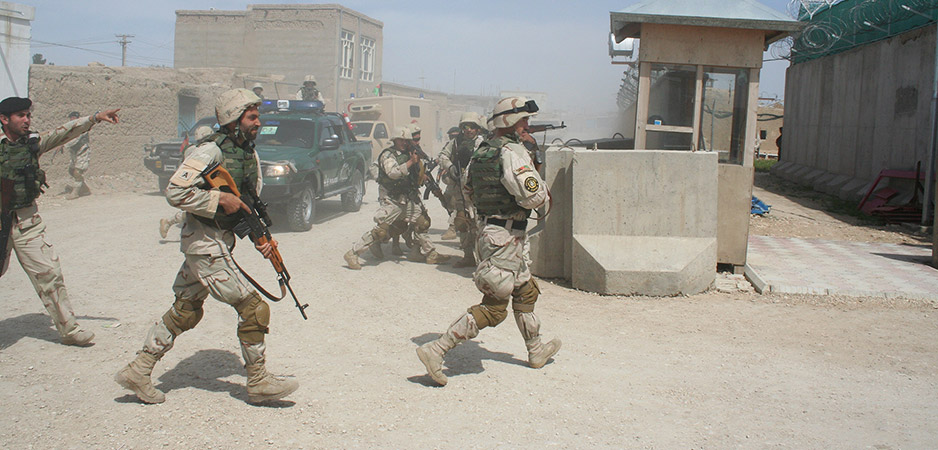The security situation in Afghanistan is deteriorating dramatically. The Taliban have captured the country’s border crossing to Tajikistan. Prospects of civil war have risen.
Even as the US withdrawal gains momentum, Afghan leaders are visiting Washington to meet President Joe Biden on June 25. This includes President Ashraf Ghani and Abdullah Abdullah, the chairperson of the High Peace Council for Reconciliation.
The Hazara Minority’s Precarious Existence in Afghanistan
The Taliban are filling the vacuum that Americans are leaving behind. Violence has surged across Afghanistan and the government is losing territory by the day. As September 11, the deadline for the departure of American troops, draws nigh, the Taliban are becoming increasingly emboldened.
The government in Kabul has a reputation for corruption and is proving to be ineffective. People are dying every day in cities, towns and villages from terror, crime and hunger. The US is leaving behind a royal mess. If its presence in Afghanistan was problematic, its withdrawal promises to be doubly so.
Ghani Is Running Out of Time
Stakes are high in Biden’s first meeting with the Afghan leaders even if expectations are low. Ghani is not an ideal interlocutor. He has presided over a notoriously corrupt administration of a failing state. Kabul’s writ does not even run in the city. Even if Biden and Ghani do a dream deal, the latter is highly unlikely to be able to uphold his part of the bargain.
Biden wants to bring back American troops and minimize the instability that will inevitably follow in Afghanistan. He needs a good partner to work with. Once, Ghani was the blue-eyed boy of Washington. His academic credentials and bureaucratic experience gave him a halo that few Afghans possessed. Ghani has squandered all the resources that the US provided him. He has few, if any, opportunities left. Ghani’s government is on the verge of total collapse.
According to a new assessment of the US intelligence community, Ghani’s government could collapse within six months of the American military withdrawal from Afghanistan. The government has lost credibility because it has failed to provide basic public services to the people. Consequently, the people have lost hope. Yet again, Afghans are voting with their feet and leaving the country in droves.
Like many African strongmen, Ghani has surrounded himself with sycophantic cronies. He sees himself as the savior and messiah of Afghanistan. The president has no idea that he has lost all credibility in his second term. His lofty rhetoric fails to reflect Afghanistan’s grim realities.
Ghani is not entirely delusional, though. He realized fully well that he occupies his fancy palace in Kabul thanks to the barrels of American guns. Once the Americans leave, he is toast. Therefore, he has opposed Biden’s peace plan that calls for a political settlement between warring parties, including the Taliban. Unsurprisingly, Pakistani Prime Minister Imran Khan has lauded Biden’s plan.
What Joe Biden Must Do
Afghans fear that the US might be leaving their country to the mercy of the Pakistani generals. After the last Soviet troops departed from Afghanistan in 1989, the Pakistan-trained Taliban took over. This provided Pakistan with strategic depth, jihadis to send to India and a bargaining chip vis-à-vis Washington. History might be about to repeat itself and Afghans are terrified of another tragedy.
Biden is meeting Ghani to reassure Afghans that he is not leaving them to the Taliban wolves. The official American line is that the US will continue to support the legitimately elected government in Kabul. Yet the Americans are infamous for short attention spans and Afghans fear they will be forgotten again. After all, Charlie Wilson could raise a ton of money to fight the Soviets but very little for schools or hospitals afterward. As the iconic American movie on the late congressman records, no one cared.
There is another historical parallel. When US troops left Saigon in 1975, the Viet Cong overran Vietnam. As the last American planes fly back from Bagram, the Taliban could do the same in Afghanistan. Washington must act differently this time around. The US has to back Afghan security forces, put its weight behind a people-centered peace process and uphold Biden’s much-touted democracy agenda.
If the US fails, the Taliban will be in charge. Pakistan will make Afghanistan a puppet state. Bagram, the closest American airbase to China’s western borders, might well fall to Beijing. China’s Belt and Road Initiative (BRI) might expand into Afghanistan too. The risks for Afghanistan, the region and the US are only too real.
In an article for The Washington Post, David Ignatius argues that “a summer of pain awaits” Afghanistan. Over the years, American leaders have found themselves in a Catch-22 regarding Afghanistan. They cannot tell the public that Afghanistan deserves American blood and treasure forever. Nearly 20 years have passed since the tragic 9/11 attacks in the United States. American troops have patrolled Afghanistan’s dusty roads, fighter jets have flown endless sorties and drones have liquidated fearsome foes. Yet peace is nowhere in sight. At the same time, packing up and leaving only fuels the raging violence further, leaves behind a geopolitical vacuum and allows rival powers leverage against American interests.
Donald Trump promised American troops would come home when he was president. Biden has set a date for the final withdrawal. By doing so, he has tied his hands. The Taliban now know that American troops are preparing to leave and will soon be gone. In their worldview, the Taliban have made history. After humbling the Soviets, they have defeated the evil Uncle Sam. They see themselves as superiors of super powers in their own backyard. With morale sky high, they have launched bold military operations to take over Afghanistan. It seems the US can do little to prevent the Taliban from taking over.
Yet things are never as dire or as rosy as they seem. Many Afghans have fought the Taliban and are willing to fight them again. The Ghani government may be incorrigibly corrupt, but its officials want to avoid the fate of the Soviet-backed leader Mohammad Najibullah whose corpse was strung for public display. Crises tend to focus minds and this might be the best time to deal with Afghanistan’s manifestly flawed leaders.
Even as American troops are leaving, Biden must support Afghan leaders against the Taliban. He must make that support conditional on Ghani and his cronies leaving office by a certain date. They must put in place a more credible Afghan leadership to take on the Taliban. After all, the British replaced Neville Chamberlain with Winston Churchill during World War II. For Afghanistan, this is a time of national crisis.
The Taliban could take over much of the country but will struggle to hold it together. A civil war might break out. The disintegration of Afghanistan might move from the realm of possibility to reality. Ambitious powers in the near neighborhood will take advantage of the ensuing chaos. Unlike Vietnam, Afghanistan will not become a nation of high literacy, low infant mortality and better nutrition. It will yet again become an impoverished land where fanatics and terrorists will find refuge and a base for their global jihadist operations.
President Biden has long declared that “America is back.” Afghanistan could smash that assertion to smithereens and demonstrate that America is just going back home. If he is serious about American leadership and holding aloft the torch for democracy, Biden cannot throw Afghanistan to the dogs of war. He has to build an international coalition that pushes through a peace process, backs credible leaders in Afghanistan and provides aerial, if not ground assistance to those putting their lives on the line against the Taliban.
The views expressed in this article are the author’s own and do not necessarily reflect Fair Observer’s editorial policy.
Support Fair Observer
We rely on your support for our independence, diversity and quality.
For more than 10 years, Fair Observer has been free, fair and independent. No billionaire owns us, no advertisers control us. We are a reader-supported nonprofit. Unlike many other publications, we keep our content free for readers regardless of where they live or whether they can afford to pay. We have no paywalls and no ads.
In the post-truth era of fake news, echo chambers and filter bubbles, we publish a plurality of perspectives from around the world. Anyone can publish with us, but everyone goes through a rigorous editorial process. So, you get fact-checked, well-reasoned content instead of noise.
We publish 3,000+ voices from 90+ countries. We also conduct education and training programs
on subjects ranging from digital media and journalism to writing and critical thinking. This
doesn’t come cheap. Servers, editors, trainers and web developers cost
money.
Please consider supporting us on a regular basis as a recurring donor or a
sustaining member.
Will you support FO’s journalism?
We rely on your support for our independence, diversity and quality.








Commenting Guidelines
Please read our commenting guidelines before commenting.
1. Be Respectful: Please be polite to the author. Avoid hostility. The whole point of Fair Observer is openness to different perspectives from perspectives from around the world.
2. Comment Thoughtfully: Please be relevant and constructive. We do not allow personal attacks, disinformation or trolling. We will remove hate speech or incitement.
3. Contribute Usefully: Add something of value — a point of view, an argument, a personal experience or a relevant link if you are citing statistics and key facts.
Please agree to the guidelines before proceeding.